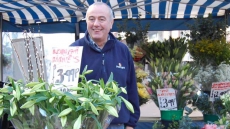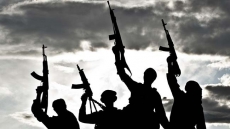DUBAI, United Arab Emirates — Marching with thousands of other pilgrims at last year's hajj in Saudi Arabia, 23-year-old Sobia Noor of Pakistan felt the crowd get tighter and the air grow thicker in the scorching heat.
Suddenly, there was shouting and crying along the narrow street bordered by tall metal barriers.
She was holding hands tightly with her mother and aunt, but her grip was broken as a push of people struck her like a giant wave. She lost sight of her father. Thrown to the ground with others on top of her, she couldn't breathe.
The next thing she remembers was being sprinkled with water and pulled from the pile. Then she saw a scene that still haunts her: "There were heaps of bodies all around, and some injured were crying for help," she said.
The stampede and crush on Sept. 24, 2015, along Road 204 in Mina, a pilgrimage route on the outskirts of Mecca, killed at least 2,400 people — a disaster that the kingdom has yet to fully acknowledge or explain.
More than 2 million Muslims are expected at this year's hajj that begins Saturday, and Saudi authorities say they have done all they can to prepare for the five-day pilgrimage. They are reducing the density of crowds where the crush took place, widening narrow streets in Mina, and introducing some high-tech measures.
But survivors and relatives of the dead, still angered by the tragedy and bewildered by what they perceive as a lack of an adequate response by the Saudi authorities, fear the plans won't be enough to prevent another catastrophe.
Saudi Arabia's official death toll from the crush is 769, a figure that has not been updated since Sept. 26.
But an Associated Press count, based on media reports and officials' comments from 36 of the more than 180 countries that sent citizens to the hajj, found that at least 2,426 people had been killed.
Saudi authorities have yet to offer families of victims any financial compensation. No officials have been held accountable and no findings from their investigation have been issued.

Asked about the status of the Saudi inquiry, Saudi Interior Ministry spokesman Mansour al-Turki told the AP that a committee including engineers and security and health officials "is still working and didn't release any statement yet."
Initial statements by Saudi police said it appeared that two large crowds heading in opposite directions intersected on Road 204. Crowds in the back, unaware of the congestion ahead, kept pressing forward.
An Egyptian survivor told the AP that poorly trained Saudi troops refused to open one of the gates along Road 204 to help those who were suffocating. The man, who spoke on condition of anonymity because he lives in Saudi Arabia and feared repercussions, said the troops did not know what to do and appeared to be waiting for orders as the bodies piled up.
Saudi Arabia's regional foe, Iran, has said that almost 500 of those killed were Iranian pilgrims — the most of any country — and blamed the disaster on Saudi negligence.
Iran's supreme leader, Ayatollah Ali Khamenei, this week accused Saudi authorities of killing pilgrims who were injured in the crush by putting them in containers with the dead.
Iran is not sending its citizens to hajj this year and has called on Saudi Arabia to share its prestigious custodianship and management of the hajj with other Muslim nations. That notion is rejected by the kingdom's Sunni rulers who accuse Shiite-led Iran of playing politics with the pilgrimage.
In recent decades, Saudi Arabia has spent billions of dollars to improve hajj safety and accommodate more people. It built the massive, multistory Jamarat Complex with large pedestrian paths in Mina, where pilgrims throw pebbles at columns in a ritual stoning of the devil. Many of the pedestrian roads leading to the complex are narrow, however.
The government also is working to create a National Center for Joint Security Operations to centralize oversight of the video feed from more than 5,000 cameras along hajj routes.
Despite media reports that pilgrims would be given electronic ID bracelets this year, al-Turki said the project is still being developed and won't be used.
One significant change is the expansion of Road 204 to ensure it's at least 12 metres wide (39 feet) in all areas.
Hisham Al-Falih, head of the Hajj Preparatory Committee, told AP that 12 projects costing about $53.3 million were implemented to improve the hajj this year. Some tents in Mina on streets that were previously blocked have been relocated to open roads, and some paths were widened, he said.
But al-Falih added that there is only so much his committee and others can do to prepare for dealing with crowds of up to 3 million people.
"We are humans at the end of the day. We are doing all that we can do, and the rest is with God," he said.
The hajj has always been risky, requiring long travel, physical stamina and patience. A 1990 stampede killed more than 1,400 people. Days before last year's disaster, a crane collapse killed 111 people inside Mecca's Grand Mosque housing the Kaaba, Islam's holiest site.
For Noor, the pilgrimage from her home in Multan, Pakistan, was a wedding present from her uncle. Accompanied by her father, mother and aunt, she made the trip that Muslims are to perform once in their lives as a spiritual rebirth.
On the third day of the hajj, she and her family had completed most of the rites. The stampede occurred as they were heading toward an area in the valley of Mina for the ritual stoning.
Noor spent six days in a hospital before finding her aunt, who had injured a leg and shoulder. She searched hospitals for her parents until being told they had died.
"I can't understand how my aunt and I survived that horrible incident," Noor said. "No doubt, that was a miracle."
She said the Saudis were unable to manage the crowds and the only solution is to reduce the number of visitors. The kingdom instead plans to allow more pilgrims in the coming years.
Nasser Fayad, an Egyptian newspaper editor, lost three relatives, including his 57-year-old brother who had three sons in high school and college.
"For all those who died in Mina, we are asking Saudi Arabia to financially compensate the victims, and that this compensation is for their kids," Fayad said. "The Saudi government hasn't even asked about us or even given condolences."
The Saudi Embassy should have sent an emissary to meet with the relatives of the at least 190 Egyptians killed, he said, but "there has not been a single response to what happened. As if nothing happened."
Some families tried to organize to seek reparations, but many are poor and cannot afford a lawyer, Fayad said.
At least 320 pilgrims died from Mali, and relatives there formed a group to press Saudi Arabia for answers, saying that some have not been given death certificates, while others are seeking compensation. They meet with a lawyer every Saturday.
Iranian teacher Masoud Taghiyani cited Saudi "incompetency" for the death of his 76-year-old father, saying his parents had saved for 30 years to perform the hajj.
"Saudi Arabia should accept that they were responsible for the safety of pilgrims," he said. "Then, they should pay blood money to the families of victims."

SURVIVORS RECALL THE STAMPEDE AND CRUSH AT LAST YEAR'S HAJJ
Kauser Parveen of Abbottabad, Pakistan, who said her brother, Mohammad Sajid, fell nearby, but she could not help him:
"I was feeling extreme suffocation and, in a moment, fainted. While I was collapsing, I saw my brother from a distance on the ground screaming for help and water. People in the crowd were snatching bottles of water from each other. I saw people piling up on people already collapsed."
___
Assigue Ouologuem, a 74-year-old retired postal worker from Mali, who lost consciousness in the crowd and found himself by the side of the road:
"The younger ones were lucky enough to escape quickly, but the elderly and the women had trouble getting out of the crush of people."
___
Dawood Raza, a 51-year-old businessman from Peshawar, Pakistan, who said he pushed himself toward a wall after he began suffocating:
"The scene was much like a slaughterhouse where sacrificed animals are dumped on one another. People were screaming for help, but there was no one to listen. Police officers seemed confused and looked like they were not trained to handle this kind of situation."

Mohamed Nasim, a civil servant from Quetta, Pakistan, who was walking with his wife, 44-year-old Zar Bibi:
"Somehow, I lost my wife's hand and, in an attempt to catch her back, I was pushed hard toward the concrete barrier and my arm and hand were injured. I fell near the concrete block and passed out."
"I still avoid looking into eyes of my four children, though they always console me. I feel guilty that I could not bring back their mother after the hajj."




